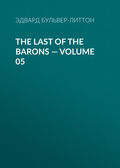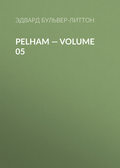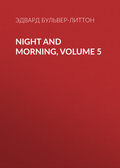
Эдвард Бульвер-Литтон
A Strange Story — Complete
And now there arrived another stranger to L——, sent for by Mr. Jeeves, the lawyer,—a stranger to L——, but not to me; my old Edinburgh acquaintance, Richard Strahan.
The will in Mr. Jeeves’s keeping, with its recent codicil, was opened and read. The will itself bore date about six years anterior to the testator’s tragic death: it was very short, and, with the exception of a few legacies, of which the most important was L10,000 to his ward, the whole of his property was left to Richard Strahan, on the condition that he took the name and arms of Derval within a year from the date of Sir Philip’s decease. The codicil, added to the will the night before his death, increased the legacy to the young lady from L10,000 to L30,000, and bequeathed an annuity of L100 a year to his Albanian servant. Accompanying the will, and within the same envelope, was a sealed letter, addressed to Richard Strahan, and dated at Paris two weeks before Sir Philip’s decease. Strahan brought that letter to me. It ran thus:—
“Richard Strahan, I advise you to pull down the house called Derval Court, and to build another on a better site, the plans of which, to be modified according to your own taste and requirements, will be found among my papers. This is a recommendation, not a command. But I strictly enjoin you entirely to demolish the more ancient part, which was chiefly occupied by myself, and to destroy by fire, without perusal, all the books and manuscripts found in the safes in my study. I have appointed you my sole executor, as well as my heir, because I have no personal friends in whom I can confide as I trust I may do in the man I have never seen, simply because he will bear my name and represent my lineage. There will be found in my writing-desk, which always accompanies me in my travels, an autobiographical work, a record of my own life, comprising discoveries, or hints at discovery, in science, through means little cultivated in our age. You will not be surprised that before selecting you as my heir and executor, from a crowd of relations not more distant, I should have made inquiries in order to justify my selection. The result of those inquiries informs me that you have not yourself the peculiar knowledge nor the habits of mind that could enable you to judge of matters which demand the attainments and the practice of science; but that you are of an honest, affectionate nature, and will regard as sacred the last injunctions of a benefactor. I enjoin you, then, to submit the aforesaid manuscript memoir to some man on whose character for humanity and honour you can place confidential reliance, and who is accustomed to the study of the positive sciences, more especially chemistry, in connection with electricity and magnetism. My desire is that he shall edit and arrange this memoir for publication; and that, wherever he feels a conscientious doubt whether any discovery, or hint of discovery, therein contained would not prove more dangerous than useful to mankind, he shall consult with any other three men of science whose names are a guarantee for probity and knowledge, and according to the best of his judgment, after such consultation, suppress or publish the passage of which he has so doubted. I own the ambition which first directed me towards studies of a very unusual character, and which has encouraged me in their pursuit through many years of voluntary exile, in lands where they could be best facilitated or aided,—the ambition of leaving behind me the renown of a bold discoverer in those recesses of nature which philosophy has hitherto abandoned to superstition. But I feel, at the moment in which I trace these lines, a fear lest, in the absorbing interest of researches which tend to increase to a marvellous degree the power of man over all matter, animate or inanimate, I may have blunted my own moral perceptions; and that there may be much in the knowledge which I sought and acquired from the pure desire of investigating hidden truths, that could be more abused to purposes of tremendous evil than be likely to conduce to benignant good. And of this a mind disciplined to severe reasoning, and uninfluenced by the enthusiasm which has probably obscured my own judgment, should be the unprejudiced arbiter. Much as I have coveted and still do covet that fame which makes the memory of one man the common inheritance of all, I would infinitely rather that my name should pass away with my breath, than that I should transmit to my fellowmen any portion of a knowledge which the good might forbear to exercise and the bad might unscrupulously pervert. I bear about with me, wherever I wander, a certain steel casket. I received this casket, with its contents, from a man whose memory I hold in profound veneration. Should I live to find a person whom, after minute and intimate trial of his character, I should deem worthy of such confidence, it is my intention to communicate to him the secret how to prepare and how to use such of the powders and essences stored within that casket as I myself have ventured to employ. Others I have never tested, nor do I know how they could be resupplied if lost or wasted. But as the contents of this casket, in the hands of any one not duly instructed as to the mode of applying them, would either be useless, or conduce, through inadvertent and ignorant misapplication, to the most dangerous consequences; so, if I die without having found, and in writing named, such a confidant as I have described above, I command you immediately to empty all the powders and essences found therein into any running stream of water, which will at once harmlessly dissolve them. On no account must they be cast into fire!
“This letter, Richard Strahan, will only come under your eyes in case the plans and the hopes which I have formed for my earthly future should be frustrated by the death on which I do not calculate, but against the chances of which this will and this letter provide. I am about to revisit England, in defiance of a warning that I shall be there subjected to some peril which I refused to have defined, because I am unwilling that any mean apprehension of personal danger should enfeeble my nerves in the discharge of a stern and solemn duty. If I overcome that peril, you will not be my heir; my testament will be remodelled; this letter will be recalled and destroyed. I shall form ties which promise me the happiness I have never hitherto found, though it is common to all men,—the affections of home, the caresses of children, among whom I may find one to whom hereafter I may bequeath, in my knowledge, a far nobler heritage than my lands. In that case, however, my first care would be to assure your own fortunes. And the sum which this codicil assures to my betrothed would be transferred to yourself on my wedding-day. Do you know why, never having seen you, I thus select you for preference to all my other kindred; why my heart, in writing thus, warms to your image? Richard Strahan, your only sister, many years older than yourself—you were then a child—was the object of my first love. We were to have been wedded, for her parents deceived me into the belief that she returned my affection. With a rare and nobler candour, she herself informed me that her heart was given to another, who possessed not my worldly gifts of wealth and station. In resigning my claims to her hand, I succeeded in propitiating her parents to her own choice. I obtained for her husband the living which he held, and I settled on your sister the dower which, at her death, passed to you as the brother to whom she had shown a mother’s love, and the interest of which has secured you a modest independence.
“If these lines ever reach you, recognize my title to reverential obedience to commands which may seem to you wild, perhaps irrational; and repay, as if a debt due from your own lost sister, the affection I have borne to you for her sake.”
While I read this long and strange letter, Strahan sat by my side, covering his face with his hands, and weeping with honest tears for the man whose death had made him powerful and rich.
“You will undertake the trust ordained to me in this letter,” said he, struggling to compose himself. “You will read and edit this memoir; you are the very man he himself would have selected. Of your honour and humanity there can be no doubt, and you have studied with success the sciences which he specifies as requisite for the discharge of the task he commands.”
At this request, though I could not be wholly unprepared for it, my first impulse was that of a vague terror. It seemed to me as if I were becoming more and more entangled in a mysterious and fatal web. But this impulse soon faded in the eager yearnings of an ardent and irresistible curiosity.
I promised to read the manuscript, and in order that I might fully imbue my mind with the object and wish of the deceased, I asked leave to make a copy of the letter I had just read. To this Strahan readily assented, and that copy I have transcribed in the preceding pages.
I asked Strahan if he had yet found the manuscript. He said, “No, he had not yet had the heart to inspect the papers left by the deceased. He would now do so. He should go in a day or two to Derval Court, and reside there till the murderer was discovered, as doubtless he soon must be through the vigilance of the police. Not till that discovery was made should Sir Philip’s remains, though already placed in their coffin, be consigned to the family vault.”
Strahan seemed to have some superstitious notion that the murderer might be more secure from justice if his victim were thrust unavenged into the tomb.
CHAPTER XXXVI
The belief prevalent in the town ascribed the murder of Sir Philip to the violence of some vulgar robber, probably not an inhabitant of L——. Mr. Vigors did not favour that belief. He intimated an opinion, which seemed extravagant and groundless, that Sir Philip had been murdered, for the sake not of the missing purse, but of the missing casket. It was currently believed that the solemn magistrate had consulted one of his pretended clairvoyants, and that this impostor had gulled him with assurances, to which he attached a credit that perverted into egregiously absurd directions his characteristic activity and zeal.
Be that as it may, the coroner’s inquest closed without casting any light on so mysterious a tragedy.
What were my own conjectures I scarcely dared to admit,—I certainly could not venture to utter them; but my suspicions centred upon Margrave. That for some reason or other he had cause to dread Sir Philip’s presence in L—— was clear, even to my reason. And how could my reason reject all the influences which had been brought to bear on my imagination, whether by the scene in the museum or my conversation with the deceased? But it was impossible to act on such suspicions,—impossible even to confide them. Could I have told to any man the effect produced on me in the museum, he would have considered me a liar or a madman. And in Sir Philip’s accusations against Margrave, there was nothing tangible,—nothing that could bear repetition. Those accusations, if analyzed, vanished into air. What did they imply?—that Margrave was a magician, a monstrous prodigy, a creature exceptional to the ordinary conditions of humanity. Would the most reckless of mortals have ventured to bring against the worst of characters such a charge, on the authority of a deceased witness, and to found on evidence so fantastic the awful accusation of murder? But of all men, certainly I—a sober, practical physician—was the last whom the public could excuse for such incredible implications; and certainly, of all men, the last against whom any suspicion of heinous crime would be readily entertained was that joyous youth in whose sunny aspect life and conscience alike seemed to keep careless holiday. But I could not overcome, nor did I attempt to reason against, the horror akin to detestation, that had succeeded to the fascinating attraction by which Margrave had before conciliated a liking founded rather on admiration than esteem.
In order to avoid his visits I kept away from the study in which I had habitually spent my mornings, and to which he had been accustomed to so ready an access; and if he called at the front door, I directed my servant to tell him that I was either from home or engaged. He did attempt for the first few days to visit me as before, but when my intention to shun him became thus manifest, desisted naturally enough, as any other man so pointedly repelled would have done.
I abstained from all those houses in which I was likely to meet him, and went my professional round of visits in a close carriage, so that I might not be accosted by him in his walks.
One morning, a very few days after Strahan had shown me Sir Philip Derval’s letter, I received a note from my old college acquaintance, stating that he was going to Derval Court that afternoon; that he should take with him the memoir which he had found, and begging me to visit him at his new home the next day, and commence my inspection of the manuscript. I consented eagerly.
That morning, on going my round, my carriage passed by another drawn up to the pavement, and I recognized the figure of Margrave standing beside the vehicle, and talking to some one seated within it. I looked back, as my own carriage whirled rapidly by, and saw with uneasiness and alarm that it was Richard Strahan to whom Margrave was thus familiarly addressing himself. How had the two made acquaintance?
Was it not an outrage on Sir Philip Derval’s memory, that the heir he had selected should be thus apparently intimate with the man whom he had so sternly denounced? I became still more impatient to read the memoir: in all probability it would give such explanations with respect to Margrave’s antecedents, as, if not sufficing to criminate him of legal offences, would at least effectually terminate any acquaintance between Sir Philip’s successor and himself.
All my thoughts were, however, diverted to channels of far deeper interest even than those in which my mind had of late been so tumultuously whirled along, when, on returning home, I found a note from Mrs. Ashleigh. She and Lilian had just come back to L——, sooner than she had led me to anticipate. Lilian had not seemed quite well the last day or two, and had been anxious to return.
CHAPTER XXXVII
Let me recall it—softly,—softly! Let me recall that evening spent with her!—that evening, the last before darkness rose between us like a solid wall.
It was evening, at the close of summer. The sun had set, the twilight was lingering still. We were in the old monastic garden,—garden so quiet, so cool, so fragrant. She was seated on a bench under the one great cedar-tree that rose sombre in the midst of the grassy lawn with its little paradise of flowers. I had thrown myself on the sward at her feet; her hand so confidingly lay in the clasp of mine. I see her still,—how young, how fair, how innocent!
Strange, strange! So inexpressibly English; so thoroughly the creature of our sober, homely life! The pretty delicate white robe that I touch so timorously, and the ribbon-knots of blue that so well become the soft colour of the fair cheek, the wavy silk of the brown hair! She is murmuring low her answer to my trembling question.
“As well as when last we parted? Do you love me as well still?”
“There is no ‘still’ written here,” said she, softly pressing her hand to her heart. “Yesterday is as to-morrow in the Forever.”
“Ah, Lilian! if I could reply to you in words as akin to poetry as your own!”
“Fie! you who affect not to care for poetry!”
“That was before you went away; before I missed you from my eyes, from my life; before I was quite conscious how precious you were to me, more precious than common words can tell! Yes, there is one period in love when all men are poets, however the penury of their language may belie the luxuriance of their fancies. What would become of me if you ceased to love me?”
“Or of me, if you could cease to love?”
“And somehow it seems to me this evening as if my heart drew nearer to you,—nearer as if for shelter.”
“It is sympathy,” said she, with tremulous eagerness,—“that sort of mysterious sympathy which I have often heard you deny or deride; for I, too, feel drawn nearer to you, as if there were a storm at hand. I was oppressed by an indescribable terror in returning home, and the moment I saw you there came a sense of protection.”
Her head sank on my shoulder: we were silent some moments; then we both rose by the same involuntary impulse, and round her slight form I twined my strong arm of man. And now we are winding slow under the lilacs and acacias that belt the lawn. Lilian has not yet heard of the murder, which forms the one topic of the town, for all tales of violence and blood affected her as they affect a fearful child. Mrs. Ashleigh, therefore, had judiciously concealed from her the letters and the journals by which the dismal news had been carried to herself. I need scarcely say that the grim subject was not broached by me. In fact, my own mind escaped from the events which had of late so perplexed and tormented it; the tranquillity of the scene, the bliss of Lilian’s presence, had begun to chase away even that melancholy foreboding which had overshadowed me in the first moments of our reunion. So we came gradually to converse of the future,—of the day, not far distant, when we two should be as one. We planned our bridal excursion. We would visit the scenes endeared to her by song, to me by childhood,—the banks and waves of my native Windermere,—our one brief holiday before life returned to labour, and hearts now so disquieted by hope and joy settled down to the calm serenity of home.
As we thus talked, the moon, nearly rounded to her full, rose amidst skies without a cloud. We paused to gaze on her solemn haunting beauty, as where are the lovers who have not paused to gaze? We were then on the terrace walk, which commanded a view of the town below. Before us was a parapet wall, low on the garden side, but inaccessible on the outer side, forming part of a straggling irregular street that made one of the boundaries dividing Abbey Hill from Low Town. The lamps of the thoroughfares, in many a line and row beneath us, stretched far away, obscured, here and there, by intervening roofs and tall church towers. The hum of the city came to our ears, low and mellowed into a lulling sound. It was not displeasing to be reminded that there was a world without, as close and closer we drew each to each,—worlds to one another! Suddenly there carolled forth the song of a human voice,—a wild, irregular, half-savage melody, foreign, uncomprehended words,—air and words not new to me. I recognized the voice and chant of Margrave. I started, and uttered an angry exclamation.
“Hush!” whispered Lilian, and I felt her frame shiver within my encircling arm. “Hush! listen! Yes; I have heard that voice before—last night—”
“Last night! you were not here; you were more than a hundred miles away.”
“I heard it in a dream! Hush, hush!”
The song rose louder; impossible to describe its effect, in the midst of the tranquil night, chiming over the serried rooftops, and under the solitary moon. It was not like the artful song of man, for it was defective in the methodical harmony of tune; it was not like the song of the wild-bird, for it had no monotony in its sweetness: it was wandering and various as the sounds from an AEolian harp. But it affected the senses to a powerful degree, as in remote lands and in vast solitudes I have since found the note of the mocking-bird, suddenly heard, affects the listener half with delight, half with awe, as if some demon creature of the desert were mimicking man for its own merriment. The chant now had changed into an air of defying glee, of menacing exultation; it might have been the triumphant war-song of some antique barbarian race. The note was sinister; a shadow passed through me, and Lilian had closed her eyes, and was sighing heavily; then with a rapid change, sweet as the coo with which an Arab mother lulls her babe to sleep, the melody died away. “There, there, look,” murmured Lilian, moving from me, “the same I saw last night in sleep; the same I saw in the space above, on the evening I first knew you!”
Her eyes were fixed, her hand raised; my look followed hers, and rested on the face and form of Margrave. The moon shone full upon him, so full as if concentrating all its light upon his image. The place on which he stood (a balcony to the upper story of a house about fifty yards distant) was considerably above the level of the terrace from which we gazed on him. His arms were folded on his breast, and he appeared to be looking straight towards us. Even at that distance, the lustrous youth of his countenance appeared to me terribly distinct, and the light of his wondrous eye seemed to rest upon us in one lengthened, steady ray through the limpid moonshine. Involuntarily I seized Lilian’s hand, and drew her away almost by force, for she was unwilling to move, and as I led her back, she turned her head to look round; I, too, turned in jealous rage! I breathed more freely. Margrave had disappeared!
“How came he there? It is not his hotel. Whose house is it?” I said aloud, though speaking to myself.
Lilian remained silent, her eyes fixed upon the ground as if in deep revery. I took her hand; it did not return my pressure. I felt cut to the heart when she drew coldly from me that hand, till then so frankly cordial. I stopped short: “Lilian, what is this? you are chilled towards me. Can the mere sound of that man’s voice, the mere glimpse of that man’s face, have—” I paused; I did not dare to complete my question.
Lilian lifted her eyes to mine, and I saw at once in those eyes a change. Their look was cold; not haughty, but abstracted. “I do not understand you,” she said, in a weary, listless accent. “It is growing late; I must go in.”
So we walked on moodily, no longer arm in arm, nor hand in hand. Then it occurred to me that, the next day, Lilian would be in that narrow world of society; that there she could scarcely fail to hear of Margrave, to meet, to know him. Jealousy seized me with all its imaginary terrors, and amidst that jealousy, a nobler, purer apprehension for herself. Had I been Lilian’s brother instead of her betrothed, I should not have trembled less to foresee the shadow of Margrave’s mysterious influence passing over a mind so predisposed to the charm which Mystery itself has for those whose thoughts fuse their outlines in fancies, whose world melts away into Dreamland. Therefore I spoke.
“Lilian, at the risk of offending you-alas! I have never done so before this night—I must address to you a prayer which I implore you not to regard as the dictate of a suspicion unworthy you and myself. The person whom you have just heard and seen is, at present, much courted in the circles of this town. I entreat you not to permit any one to introduce him to you. I entreat you not to know him. I cannot tell you all my reasons for this petition; enough that I pledge you my honour that those reasons are grave. Trust, then, in my truth, as I trust in yours. Be assured that I stretch not the rights which your heart has bestowed upon mine in the promise I ask, as I shall be freed from all fear by a promise which I know will be sacred when once it is given.”
“What promise?” asked Lilian, absently, as if she had not heard my words.
“What promise? Why, to refuse all acquaintance with that man; his name is Margrave. Promise me, dearest, promise me.”
“Why is your voice so changed?” said Lilian. “Its tone jars on my ear,” she added, with a peevishness so unlike her, that it startled me more than it offended; and without a word further, she quickened her pace, and entered the house.
For the rest of the evening we were both taciturn and distant towards each other. In vain Mrs. Ashleigh kindly sought to break down our mutual reserve. I felt that I had the right to be resentful, and I clung to that right the more because Lilian made no attempt at reconciliation. This, too, was wholly unlike herself, for her temper was ordinarily sweet,—sweet to the extreme of meekness; saddened if the slightest misunderstanding between us had ever vexed me, and yearning to ask forgiveness if a look or a word had pained me. I was in hopes that, before I went away, peace between us would be restored. But long ere her usual hour for retiring to rest, she rose abruptly, and, complaining of fatigue and headache, wished me “good-night,” and avoided the hand I sorrowfully held out to her as I opened the door.
“You must have been very unkind to poor Lilian,” said Mrs. Ashleigh, between jest and earnest, “for I never saw her so cross to you before. And the first day of her return, too!”
“The fault is not mine,” said I, somewhat sullenly; “I did but ask Lilian, and that as a humble prayer, not to make the acquaintance of a stranger in this town against whom I have reasons for distrust and aversion. I know not why that prayer should displease her.”
“Nor I. Who is the stranger?”
“A person who calls himself Margrave. Let me at least entreat you to avoid him!”
“Oh, I have no desire to make acquaintance with strangers. But, now Lilian is gone, do tell me all about this dreadful murder. The servants are full of it, and I cannot keep it long concealed from Lilian. I was in hopes that you would have broken it to her.”
I rose impatiently; I could not bear to talk thus of an event the tragedy of which was associated in my mind with circumstances so mysterious. I became agitated and even angry when Mrs. Ashleigh persisted in rambling woman-like inquiries,—“Who was suspected of the deed? Who did I think had committed it? What sort of a man was Sir Philip? What was that strange story about a casket?” Breaking from such interrogations, to which I could give but abrupt and evasive answers, I seized my hat and took my departure.







